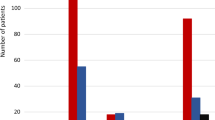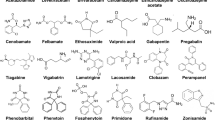Abstract
Purpose of Review
The purpose of this review is to provide an overview of psychiatric medications that impact blood pressure in adult patients either as a direct side effect or indirectly, via negative metabolic impact or interactions with other medications. In addition, pertinent interactions between psychiatric medications and antihypertensive agents will be discussed.
Recent Findings
Although the novel intranasal antidepressant, esketamine, has been shown to increase blood pressure shortly after dosing, treatment with antihypertensive medications is not typically required. In addition, no increase in serious adverse cardiac events was reported with this medication. The negative metabolic impact of antipsychotic medications has been shown to occur within the first month of treatment and necessitates early monitoring. When compared with the general population with cardiovascular disease, mortality risk in patients with severe and persistent psychiatric illness is higher, and death occurs 10 years earlier.
Summary
There are several psychiatric treatments that increase blood pressure directly as well as indirectly, via negative metabolic impact and drug/diet interactions. Fortunately, there are no absolute contraindications for use of any psychiatric medication in patients with pre-existing hypertension. Given data which suggests that patients diagnosed with more severe psychiatric disorders are known to receive inadequate medical care for hypertensive illness and experience increased mortality risk from cardiovascular disease, it is important for all physicians to be aware of the increased risk in this population and for both thorough assessment and treatment to occur.
Similar content being viewed by others
References
Papers of particular interest, published recently, have been highlighted as: • Of importance
Whelton PK, Carey RM, Aronow WS, Casey Jr DE, Collins KJ, Dennison Himmelfarb C, DePalma SM, Gidding S, Jamerson KA, Jones DW, MacLaughlin EJ, Muntner P, Ovbiagele B, Smith Jr SC, Spencer CC, Stafford RS, Taler SJ, Thomas RJ, Williams Sr KA, Williamson JD, Wright Jr JT Guideline for the prevention, detection, evaluation and management of high blood pressure in adults. A report of the American College of Cardiology/American Heart Association Task Force on Clinical Practice Guidelines.J Am Coll Cardiol 2018;71 (19): e127–e248.
Mental health by the numbers. www.nami.org/mhstats Accessed 5/20/2020.
Mozaffarian D, Benjamin EJ, Go AS et al. Heart disease and stroke statistics-2016 update. A report from the American Heart Association. Circulation. 2016 Jan 26; 133(4): e38–360.
Miller B. The heavy economic burden of schizophrenia. Psychiatr Times 2016 Oct 10.
Kessler RC, Ormel J, Demler O, Stang PE. Comorbid mental disorders account for the role of impairment of commonly occuring physical disorders. J Occup Environ Med. 2003 Dec;45(12):1257–6.
Maatouk I, Herzog W, Bohlen F, et al. Association of hypertension with depression and generalized anxiety symptoms in a large population-based sample of older adults. J Hypertens. 2016 Sep;34(9):1711–20.
Ayerbe L, Forgnone I, Addo J, Siguero A, Gelati S, Ayis S. Hypertension risk and clincial care in patients with bipolar disorder or schizophrenia; a systematic review and meta-analysis. J Affect Disord. 2018 Jan;225:665–70.
• Westman J, Eriksson SV, Gissler M, et al. Increased cardiovascular mortality in people with schizophrenia: a 24-year national register study. Epidemiol Psychiatr Sci. 2018;27(5):519–27. This large study of a Swedish national registry highlights the disparity in cardiovascular outcomes for patients with severe and persistent mental illness when compared to the general population.
Olson M, Marcus SC. National patterns in antidepressant medication treatment. Arch Gen Psychiatry. 2019 Aug;66(8):848–56.
Coupland C, Hill T, Morriss R. Antidepressant use and risk of cardiovascular outcomes in people aged 20-64: cohort study using primary care database. BMJ. 2016;352:i1350.
Tampi RR, Balderas M, Carter K, et al. Citalopram, QTc prolongation, and torsade de pointes. Psychosomatics. 2015;56:36–43.
Nezafati MH, Eshraghi A, Vojdanparast M, Abtahi S, Nezafati P. Selective serotonin reuptake inhibitors and cardiovascular events: a systematic review. J Res Med Sci. 2016 Sep;21:66.
Thase M. Effects of venlafaxine on blood pressure: a meta-analysis of original data from 3744 depressed patients. J Clin Psychiatry. 1998;59:502–8.
Foy MC, Vaishnav J, Sperati CJ. Drug-induced hypertension. Endocrinol Met Clin North Am. 2019 Dec;48(4):859–73.
Teply RM, Packard KA, White ND, Hilleman DE, DiNicolantonio JJ. Treatment of depression in patients with concomitant cardiac disease. Prog Cardiovasc Dis. 2016;58(5):514–28.
Pimentel L, Trommer L. Cyclic antidepressant overdose: a review. Emerg Med Clin North Am. 1994 May;12(2):533–47.
Gillman PK. A reassessment of the safety profile of monoamine oxidase inhibitors: elucidating tired old tyramine myths. J Neural Transm. 2018 Nov;125(11):1707–17.
Fiedorowicz JG, Swartz KL. The role of monoamine oxidase inhibitors in current psychiatric practice. J Psychiatr Pract. 2004 July;10(4):239–48.
• Doherty T, Wajs E, Melkote R. Cardiac safety of esketamine nasal spray in treatment-resistant depression: results from the clinical development program. CNS Drugs. 2020;34(3):299–310. This large cohort study of patients receiving the novel antidepressant, esketamine, indicates that blood pressure elevations resulting from treatment rarely requires management with antihypertensive medications and does not lead to serious cardiovascular safety sequelae.
Handler J. Lithium and antihypertensive medication: a potentially dangerous interaction. J Clin Hypertens. 2009 Dec;11(12):738–42.
Juurlink DN, Mamdan M, Kopp A, et al. Drug-induced lithium toxicity in the elderly: a population-based study. J Am Geriatr Soc. 2004 May;52(5):794–8.
• Zhang Y, Wang Q, Reynolds GP, et al. Metabolic effects of 7 antipsychotics on patients with schizophrenia: a short-term, randomized, open-label, multicenter pharmacologic trial. J Clin Psychiatry. 2020;81(3):15–23. In this pharmacologic trial of atypical and typical antipsychotics, metabolic disturbances occurred within the first month of treatment, highlighting the importance of early monitoring of symptoms.
Ko Y, Soh M, Kang S, Lee J. The prevalence of metabolic syndrome in schizophrenic patients using antipsychotics. Clin Psychopharmacol Neurosci. 2013;11(2):80–8.
Nasrallah H. A review of the effect of atypical antipsychotics on weight. Psychoneuroendocrinology. 2003;28(1):83–96.
Chen C, Huang M, Kao C, et al. Effects of adjunctive metformin on metabolic traits in nondiabetic clozapine-treated patients with schizophrenia and the effect of metformin discontinuation on body weight: a 24-week, randomized, double-blind, placebo-controlled study. J Clin Psychiatry. 2013;74(5):e424–30.
Gugger JJ. Antipsychotic pharmacotherapy and orthostatic hypertension: identification and management. CNS Drugs. 2011;25(8):659–71.
Gerhard T, Winterstein AG, Olfson M, Huang C, Saidi A, Crystal S. Preexisting cardiovascular conditions and pharmacological treatment of adult ADHD. Pharmacoepidemiol Drug Saf. 2010 May;19(5):457–64.
Martinez-Raga J, Knecht C, Szerman N, Martinez MI. Risk of serious cardiovascular problems with medications for attention-deficit hyperactivity disorder. CNS Drugs. 2013;27:15–30.
Schelleman H, Bilker WB, Kimmel SE, Daniel GW, Newcomb C, Guevara JP, et al. Methylphenidate and risk of serious cardiovascular events in adults. Am J Psychiatry. 2012;169:178–85.
Cooper WO, Habel LA, Sox CM, et al. ADHD drugs and serious cardiovascular events in children and young adults. N Engl J Med. 2011;365(20):1896–904.
Feighner JP, Boyer WF, Tyler DL, Neborski RJ. Adverse consequences of fluoxetine-MAOI combination therapy. J Clin Psychiatry. 1990;51:222–5.
Ott M, Mannchen JK, Jamshidi F, Werneke U. Management of severe arterial hypertension associated with serotonin syndrome: a case report analysis based on systematic review techniques. Ther Adv Psychopharmacol. 2019;9:2045125318818814.
Hermida AP, Glass OM, Shafi H, McDonald WM. Electroconvulsive therapy in depression: current practice and future direction. Psychiatr Clin North Am. 2018;41(3):341–53.
Kerner N, Prudic J. Current electroconvulsive therapy practice and research in the geriatric population. Neuropsychiatry. 2014 Feb;4(1):33–54.
Author information
Authors and Affiliations
Corresponding author
Ethics declarations
Conflict of Interest
The authors declare that they have no conflict of interest.
Human and Animal Rights and Informed Consent
This article does not contain any studies with human or animal subjects performed by any of the authors.
Additional information
Publisher’s Note
Springer Nature remains neutral with regard to jurisdictional claims in published maps and institutional affiliations.
This article is part of the Topical Collection on Hypertension and Emergency Medicine
Rights and permissions
About this article
Cite this article
Morreale, M.K., Wake, L.A. Psychiatric Medications and Hypertension. Curr Hypertens Rep 22, 86 (2020). https://doi.org/10.1007/s11906-020-01096-4
Published:
DOI: https://doi.org/10.1007/s11906-020-01096-4




